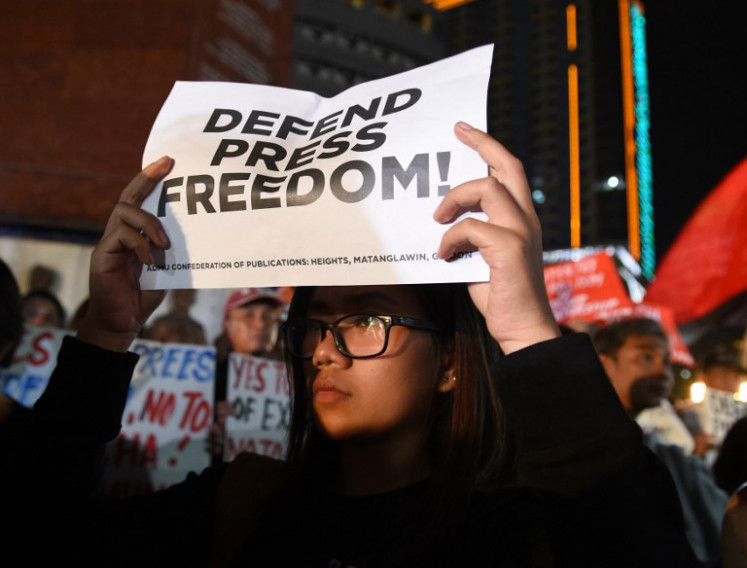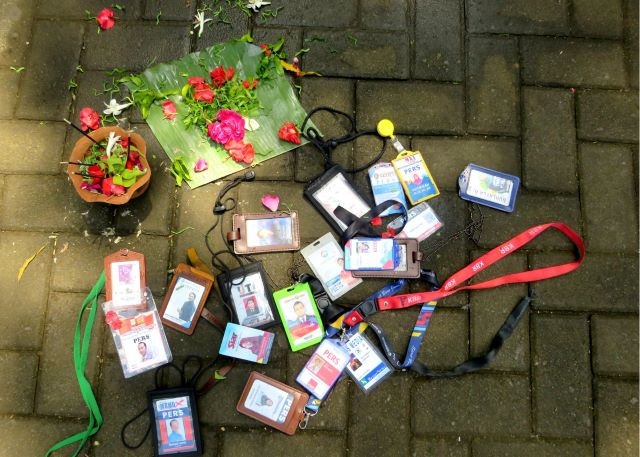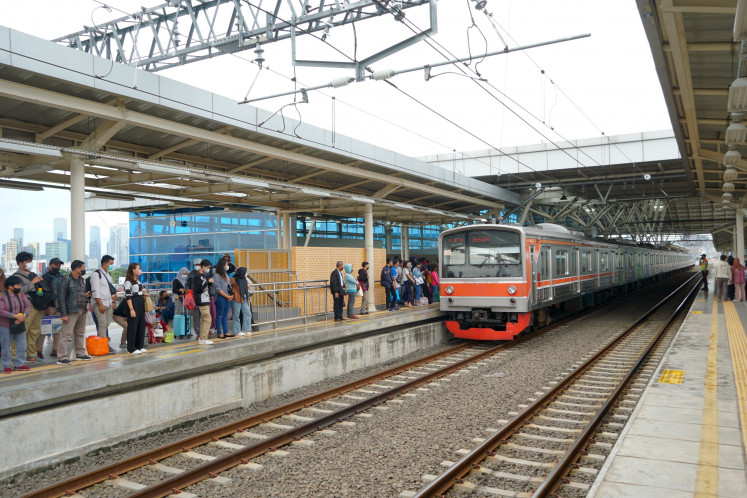Construction loans work well for BNI
Here’s how we did it: Bank Negara Indonesia (BNI) president director Achmad Baiquni (second right) explains the lender’s first-quarter performance during a press conference in Jakarta on Wednesday
Change Size

H
span class="inline inline-center">Here’s how we did it: Bank Negara Indonesia (BNI) president director Achmad Baiquni (second right) explains the lender’s first-quarter performance during a press conference in Jakarta on Wednesday.(Antara/Akbar Nugroho Gumay)
Rapid infrastructure construction encouraged by the government since the beginning of this year has, again, given state-owned lender Bank Negara Indonesia (BNI) windfall earnings.
The publicly listed bank announced on Wednesday that its loan disbursement had soared to Rp 396.52 trillion (US$29.9 billion) during this year’s first quarter, up 21.3 percent from the corresponding period of last year.
Around Rp 86 trillion or 21.7 percent of that amount was channeled to the infrastructure sector as of March. That figure is more than 20 percent higher than the Rp 71.51 trillion disbursed during last year’s first quarter.
Around 25 percent of the infrastructure loans were allocated to toll road projects, followed by power plants at 22 percent and 13 percent each to the telecommunication industry and the oil-and-gas sector.
Most of the loans went to state-owned enterprises (SOEs), such as energy giant PT Pertamina, publicly listed telecommunication firm PT Telekomunikasi Indonesia and state-owned electricity company PT PLN, BNI vice president director Herry Sidharta told a press briefing.
“Those have become the core of our growth in infrastructure [financing]. That is part of our expansion plan,” he said in Jakarta.
Loan disbursement to SOEs jumped by more than 40 percent year-on-year (yoy) to Rp 79.48 trillion as of March. Its portion in the lender’s total loan portfolio also increased to 20 percent from 17.3 percent during the same period last year.
“We believe that financing for infrastructure projects is the best option, because it supports the government’s efforts to accelerate and spread out infrastructure development as well as becomes a windfall for BNI’s business,” BNI president director Achmad Baiquni said.
The government’s infrastructure spending is set to rise by 22 percent to Rp 387.3 trillion this year to help support the country’s economic recovery after growth dropped to the slowest pace in six years in 2015.
Capitalizing on that momentum, the lender reaped Rp 3.23 trillion in net profit during the first quarter, growing by 8.5 percent from the same period of last year. Its net interest income surged by 12.3 percent yoy to
Rp 7.76 trillion, while non-interest income jumped by 14.3 percent to Rp 2.23 trillion.
Baiquni expressed optimism that BNI’s loan growth can hover around 15 percent to 17 percent this year.
Despite the upbeat assessment on loan growth, BNI saw its gross non-performing loan (NPL) ratio increase to 3 percent from 2.8 percent recorded in last year’s first three months. The net NPL ratio, however, retreated to 0.6 percent in March from 0.9 percent during the same period of last year.
“The NPL increase is not due to new bad debts but is caused by old credits that we tried but failed to restructure,” Baiquni said, pointing out Rp 1.3 trillion in debts owned by mobile phone distributor PT Trikomsel Oke since a few years ago.
The bank aims to reduce its NPL ratio to below 3 percent by the end of the year by taking several measures to improve its loan quality, including through credit restructuring efforts and legal measures.
Meanwhile, BNI collected Rp 445.05 trillion of third-party funds (DPK) during the period, marking a yoy increase of 19.8 percent. It projects to see the DPK expand by 17 percent to 18 percent by December.
“Our strategy is to increase the number of our agents and to improve our digital banking services, among other things, to [more easily reach] our customers,” Baiquni said.
BNI deploys its agents as part of a government program to improve financial inclusion and financial literacy across the country. The agents are equipped with electronic data capture (EDC) devices to carry out transactions.
It currently has around 40,000 agents and expects to increase that number to 100,000 this year.









